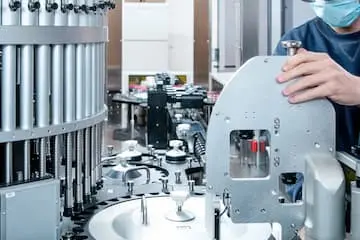In the field of material analysis and research, precise sample preparation is crucial. Our crushing and grinding machines, including Lab Jaw Crushers and Cryogenic Grinding Systems, are designed to handle a wide range of materials such as alloys, minerals, plastics, and pharmaceuticals. These machines ensure accurate results, making them ideal for laboratories and R&D departments.
Toggle Categories
Get Instant Support
Choose your preferred way to connect with our team
-
Get Free Quote Fill out form for detailed pricing
-
Send Email Detailed inquiry support
-
WhatsApp Quick mobile chat
Response Time
Within 8 hours on working days, 24 hours on holidays
Crushing & Grinding Machine
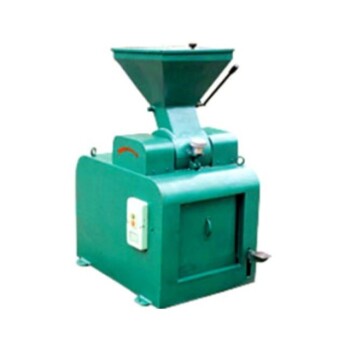
Laboratory Sealed Hammer Crusher for Efficient Sample Preparation
Item Number: KT-PCZ
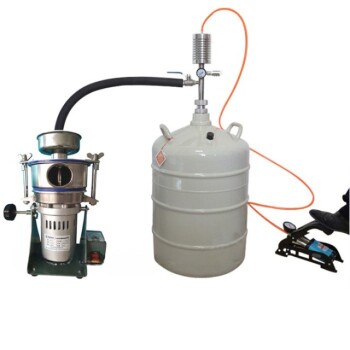
Small Cryogenic Grinder Cryomill Cryogrinder with Liquid Nitrogen for Laboratory Use
Item Number: KT-DC31
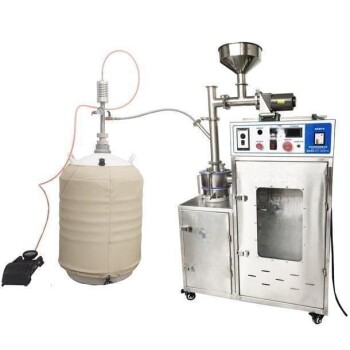
Liquid Nitrogen Cryogenic Grinder Mill Cryomill with Screw Feeder
Item Number: KT-CG02
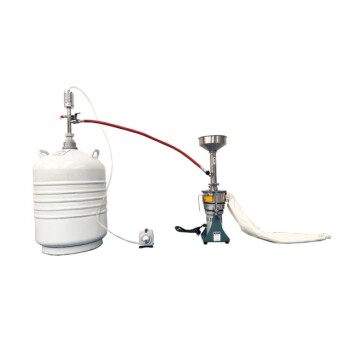
Liquid Nitrogen Cryogenic Grinder Mill Cryomill Airflow Ultrafine Pulverizer
Item Number: KT-CG03

Laboratory Jaw Crusher
Item Number: KT-EP
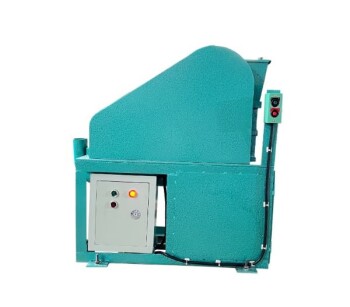
Sealed Jaw Crusher High Efficiency Environmental Protection Safe and Reliable
Item Number: KT-EPB
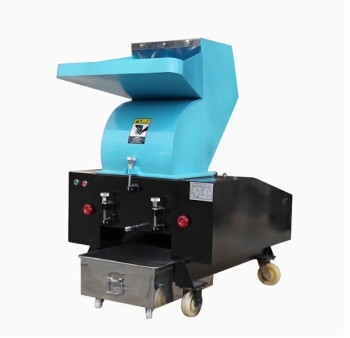
Powerful Plastic Crusher Machine
Item Number: KT-HX

Low-Temperature Water-Cooled Touchscreen Vibratory Ultrafine Pulverizer
Item Number: KT-CG04
Advanced Crushing & Grinding Solutions for Precision Sample Preparation
In the realm of material science and research, the ability to prepare samples with high precision is paramount. Our range of crushing and grinding machines is engineered to meet the stringent demands of various industries, ensuring that each sample is processed to perfection. Whether you're dealing with hard alloys, delicate pharmaceuticals, or heat-sensitive materials, our equipment is designed to deliver consistent, reliable results.
Key Features and Benefits
Lab Jaw Crusher
The Lab Jaw Crusher is a robust tool for initial size reduction of hard, brittle, and tough materials. Its efficient crushing mechanism allows for quick and uniform sample preparation, making it an essential instrument in laboratories focused on minerals, building materials, and alloys.
Cryogenic Grinding Systems
Our Cryogenic Grinding Systems utilize liquid nitrogen to freeze materials prior to grinding, ensuring that even heat-sensitive and elastic substances can be pulverized without degradation. This method is particularly effective for plastics, rubber, pharmaceuticals, and food grades, preserving the integrity of the material while delivering ultra-fine powder.
Versatility and Customization
We understand that each laboratory and industry has unique requirements. That's why our machines are designed with versatility in mind, offering customizable solutions to fit your specific needs. Whether you need a machine for small-scale R&D trials or large-scale production, we have the right equipment to meet your demands.
Why Choose Our Crushing & Grinding Machines?
- Precision Engineering: Our machines are built with precision to ensure accurate and reproducible results.
- Material Preservation: Cryogenic grinding systems preserve the chemical and physical properties of heat-sensitive materials.
- Efficiency: Designed for high throughput, our machines save time and effort in sample preparation.
- Customizable Solutions: We offer tailored solutions to meet the specific needs of your laboratory or industry.
Ready to Elevate Your Sample Preparation Process?
Explore our range of crushing and grinding machines and discover how they can enhance your research and analysis. For more information or to discuss your specific needs, please contact us. Our team of experts is ready to assist you in finding the perfect solution for your laboratory.
Applications
- Mineralogy: Efficiently prepare samples for XRF analysis.
- Pharmaceuticals: Ensure the integrity of drug compounds during grinding.
- Plastics and Rubber: Process materials without thermal degradation.
- Food and Beverage: Prepare samples for quality control and analysis.
Technical Specifications
- Lab Jaw Crusher: Model KT-PE 90x150, suitable for hard samples.
- Cryogenic Grinding Systems: Various models available, including KINTEK and KT-CG01, with options for screw feeders and airflow pulverizers.
Customer Testimonials
"The cryogenic grinding system has revolutionized our sample preparation process. The results are consistently accurate, and the machine is easy to operate." - Dr. Jane Doe, Research Scientist, XYZ Labs.
"We've been using the Lab Jaw Crusher for our mineral analysis. The precision and efficiency have significantly improved our workflow." - John Smith, Lab Manager, ABC Industries.
Contact Us
For inquiries, demonstrations, or to discuss how our crushing and grinding machines can benefit your laboratory, please contact us. We look forward to helping you achieve superior sample preparation results.
Additional Resources
- Brochures and Datasheets: Download detailed information on our products.
- Webinars and Tutorials: Learn more about our machines and their applications.
- Case Studies: Explore real-world examples of our equipment in action.
Explore our range of crushing and grinding machines and discover how they can enhance your research and analysis. For more information or to discuss your specific needs, please contact us. Our team of experts is ready to assist you in finding the perfect solution for your laboratory.
FAQ
What Is A Cryogenic Grinder And How Does It Work?
What Is A Laboratory Crusher Used For?
What Is CVD (Chemical Vapor Deposition) And What Are Its Key Advantages?
What Are The Main Applications Of Cryogenic Grinders?
How Does A Laboratory Crusher Work?
What Is A Crushing Machine?
What Are Some Common Applications Of CVD Materials?
What Are The Advantages Of Using A Cryogenic Grinder?
What Are The Main Features Of A Laboratory Jaw Crusher?
What Factors Should Be Considered When Selecting A Crushing Machine?
What Types Of CVD Materials Are Available?
Why Is Liquid Nitrogen Used In Cryogenic Grinding?
What Is The Working Principle Of A Laboratory Jaw Crusher?
How Does CVD Diamond Enhance The Performance Of Cutting Tools?
What Types Of Materials Can Be Processed Using A Cryogenic Grinder?
What Are The Advantages Of Using A Laboratory Crusher?
What Makes CVD Diamond Domes Suitable For High-performance Loudspeakers?
How Does Cryogenic Grinding Improve Material Properties?
How Does CVD Diamond Improve Thermal Management In Electronic Devices?
REQUEST A QUOTE
Our professional team will reply to you within one business day. Please feel free to contact us!
Related Articles

The Invisible Interface: Why Simple Connections Define Complex Chemistry
In electrochemistry, data integrity relies on the physical interface. Discover why the humble copper tape and gasket seal are the true guardians of your results.

The Invisible Architecture of Precision: Mastery Before the Current Flows
Achieve electrochemical accuracy by mastering the four pillars of preparation: rigorous inspection, cleaning, installation, and electrolyte management.

The Geometry of Cleanliness: Why Surface Integrity Defines Electrochemical Success
Master the art of electrolytic cell maintenance. Discover how a tiered cleaning protocol prevents contamination and ensures experimental reproducibility.

The Architecture of Control: Why Thermal Stability Defines Electrochemical Precision
Master electrochemical accuracy by understanding the interplay between three-electrode systems and thermal regulation. Eliminate variables to ensure reproducibility.

The Silent Partner: Why Material Choice in Electrochemistry is a Matter of Trust
Discover why high borosilicate glass and PTFE are the non-negotiable standards for electrolytic cells. A deep dive into material science for precise data.

How to Choose Laboratory Vacuum Pumps for Maximum Efficiency and Cost Savings
Learn how to choose the right lab vacuum pump for efficiency & cost savings. Compare oil-sealed vs. oil-free pumps & future-proof your investment.

How Freeze-Drying Cuts Transport Costs by 90% in Critical Logistics
Freeze-drying slashes transport costs by 90% in logistics for space, military, and disaster relief by reducing weight and volume. Learn how it works.

Freeze-Drying Decoded: The Science Behind Preserving Food, Medicine, and Research Materials
Discover how freeze-drying preserves food, medicine, and research materials with unmatched efficiency. Learn the science behind lyophilization and its applications.

Why Freeze-Drying is Indispensable for Preserving Sensitive Samples
Freeze-drying preserves sensitive samples by sublimation, maintaining molecular integrity and enabling stable, room-temperature storage. Essential for proteins, vaccines, and volatile compounds.

How Freeze-Drying Protects Delicate Biological Structures During Water Removal
Freeze-drying preserves biological samples by removing water without structural damage, ideal for vaccines, enzymes, and microbial cultures. Learn how it works.

Why Ultra-Low Temps are Non-Negotiable: The Science Behind Preserving Critical Biological Materials
Discover why ultra-low temperature freezers (-86°C) are vital for preserving cells, proteins, and vaccines. Learn the science behind ULT storage best practices.

Beyond the Spec Sheet: Matching Freeze Dryer Capabilities to Your Application's Critical Needs
Choose the right freeze dryer for pharma, food, or biotech. Key specs like cold trap temp, vacuum, and cooling rate impact drying speed and product quality.

How ULT Freezers Protect Scientific Discoveries in Genetics and Drug Development
ULT freezers safeguard genetic and pharmaceutical research by maintaining -80°C storage for DNA, proteins, and cell lines—preventing sample degradation and ensuring research validity.

Preserving the Irreplaceable: How ULT Freezers Protect Critical Samples Across Industries
ULT freezers at -80°C protect biological samples, vaccines, and research materials from degradation, ensuring long-term viability across industries.

Development and Principles of Frozen Tissue Crushers
Explore the history, classification, and principles of frozen tissue crushers, including grinding ball selection and how to choose the right crusher.

Application of Ultra-Micro Pulverization Technology in the Food Industry
Explores the benefits and applications of ultra-micro pulverization technology in enhancing food processing and nutrient absorption.

Cryogenic Pulverization Technology and Its Applications
Explores the process, advantages, disadvantages, and applications of cryogenic pulverization in various fields.

Application of Low-Temperature Pulverization Technology in the Spice Industry
Explores the benefits of low-temperature pulverization for maintaining spice quality and efficiency.

10 Common Dry Ultrafine Crushing Processes
Overview of various dry ultrafine crushing methods and their components.

Techniques and Methods of Freeze Pulverization for Powdered Rubber
An overview of various methods for producing powdered rubber through freeze pulverization, including liquid nitrogen and air turbine expander cold methods.
